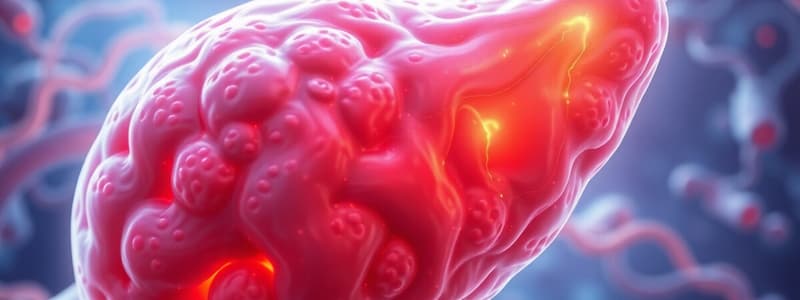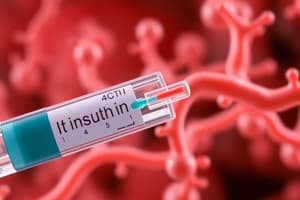Podcast
Questions and Answers
What is a primary characteristic of type 1 diabetes mellitus (T1DM)?
What is a primary characteristic of type 1 diabetes mellitus (T1DM)?
- Obesity as a common factor
- Pancreatic beta cell destruction (correct)
- Insulin resistance
- Normal insulin levels
Which factor does NOT influence the HbA1c result according to WHO?
Which factor does NOT influence the HbA1c result according to WHO?
- Anaemia
- Physical exercise (correct)
- Pregnancy
- Hemoglobin abnormalities
What is the diagnostic HbA1c threshold for pre-diabetes according to ADA guidelines?
What is the diagnostic HbA1c threshold for pre-diabetes according to ADA guidelines?
- 6.5-7.0%
- 5.7-6.4% (correct)
- 7.1% or higher
- 5.0-5.6%
How is type 2 diabetes typically diagnosed?
How is type 2 diabetes typically diagnosed?
Which of the following statements is true regarding insulin status in type 2 diabetes?
Which of the following statements is true regarding insulin status in type 2 diabetes?
What is the physiological action of insulin that decreases blood glucose levels?
What is the physiological action of insulin that decreases blood glucose levels?
Which hormone is primarily responsible for lowering blood glucose levels?
Which hormone is primarily responsible for lowering blood glucose levels?
Which process is stimulated by insulin in the liver to store excess glucose?
Which process is stimulated by insulin in the liver to store excess glucose?
What role does Akt play in insulin signaling?
What role does Akt play in insulin signaling?
Which of the following processes is inhibited by insulin?
Which of the following processes is inhibited by insulin?
What effect does the translocation of GLUT4 have in response to insulin in muscle and adipose tissues?
What effect does the translocation of GLUT4 have in response to insulin in muscle and adipose tissues?
In insulin signal transduction, what does GSK3 inhibit?
In insulin signal transduction, what does GSK3 inhibit?
What is the role of PFK2/FBPase-2 in the prevention of futile cycling?
What is the role of PFK2/FBPase-2 in the prevention of futile cycling?
Which effect does insulin have on fatty acid metabolism?
Which effect does insulin have on fatty acid metabolism?
Which of the following describes an effect of glucagon on PFK2/FBPase-2?
Which of the following describes an effect of glucagon on PFK2/FBPase-2?
What is the primary function of PEPCK in gluconeogenesis?
What is the primary function of PEPCK in gluconeogenesis?
Which of the following statements about insulin treatment in diabetes is true?
Which of the following statements about insulin treatment in diabetes is true?
How does PFK1 influence glycolysis and gluconeogenesis?
How does PFK1 influence glycolysis and gluconeogenesis?
What is the role of GLUT2 in glucose metabolism?
What is the role of GLUT2 in glucose metabolism?
Which enzyme catalyzes the conversion of Fructose-1,6-bisphosphate to Fructose-6-phosphate?
Which enzyme catalyzes the conversion of Fructose-1,6-bisphosphate to Fructose-6-phosphate?
What triggers post-translational modifications in key enzymes of glucose metabolism?
What triggers post-translational modifications in key enzymes of glucose metabolism?
What is considered the normal blood glucose level range?
What is considered the normal blood glucose level range?
What effect does glucagon have on glycogen levels in the liver?
What effect does glucagon have on glycogen levels in the liver?
Which of the following is a counter-regulatory response to low blood glucose levels?
Which of the following is a counter-regulatory response to low blood glucose levels?
Through which mechanism does glucagon primarily exert its effects?
Through which mechanism does glucagon primarily exert its effects?
What is the primary function of insulin in blood glucose regulation?
What is the primary function of insulin in blood glucose regulation?
Which process is enhanced by glucagon to provide glucose during fasting states?
Which process is enhanced by glucagon to provide glucose during fasting states?
Which hormone's action is primarily opposed by glucagon?
Which hormone's action is primarily opposed by glucagon?
What role does HSL play in the effects of glucagon on adipose tissue?
What role does HSL play in the effects of glucagon on adipose tissue?
During a state of hyperglycemia, what immediate action occurs after insulin secretion?
During a state of hyperglycemia, what immediate action occurs after insulin secretion?
What does glycogen synthesis in the liver primarily depend on?
What does glycogen synthesis in the liver primarily depend on?
What is the major feature of diabetes mellitus?
What is the major feature of diabetes mellitus?
What condition results when there is glucose in the urine?
What condition results when there is glucose in the urine?
What physiological effect can result from glucosuria?
What physiological effect can result from glucosuria?
How did children with diabetes survive before the discovery of insulin?
How did children with diabetes survive before the discovery of insulin?
What detrimental situation did a 12-year-old boy experience due to diabetes?
What detrimental situation did a 12-year-old boy experience due to diabetes?
What is often a consequence of insufficient glucose uptake by cells post-meal in diabetes?
What is often a consequence of insufficient glucose uptake by cells post-meal in diabetes?
What was the distressing choice faced by children suffering from diabetes before insulin was available?
What was the distressing choice faced by children suffering from diabetes before insulin was available?
What severe complications can arise from dehydration due to diabetes?
What severe complications can arise from dehydration due to diabetes?
What was the outcome for the child who consumed toothpaste mixed with birdseed?
What was the outcome for the child who consumed toothpaste mixed with birdseed?
What was the primary reason for the discomfort faced by children on starvation diets?
What was the primary reason for the discomfort faced by children on starvation diets?
Flashcards
Insulin action on liver
Insulin action on liver
Insulin stimulates glycogen synthesis and inhibits gluconeogenesis in the liver, lowering blood glucose.
Insulin action on adipose tissue
Insulin action on adipose tissue
Insulin promotes glucose uptake and fatty acid synthesis in adipose tissue, influencing fat storage.
Blood glucose homeostasis
Blood glucose homeostasis
Maintaining a stable blood glucose level (3.9-5.9 mmol/L) through hormonal regulation.
Glycogenesis
Glycogenesis
Signup and view all the flashcards
Gluconeogenesis
Gluconeogenesis
Signup and view all the flashcards
Insulin signaling pathway
Insulin signaling pathway
Signup and view all the flashcards
GLUT4 translocation
GLUT4 translocation
Signup and view all the flashcards
PEPCK
PEPCK
Signup and view all the flashcards
Gluconeogenesis
Gluconeogenesis
Signup and view all the flashcards
Futile Cycling
Futile Cycling
Signup and view all the flashcards
Insulin promotes (dephosphorylation) on PFK2/FBP2 for...
Insulin promotes (dephosphorylation) on PFK2/FBP2 for...
Signup and view all the flashcards
Counterregulation
Counterregulation
Signup and view all the flashcards
VLDL (Very Low-Density Lipoprotein)
VLDL (Very Low-Density Lipoprotein)
Signup and view all the flashcards
Glucagon- induced phosphorylation on PFK2/FBP2 for...
Glucagon- induced phosphorylation on PFK2/FBP2 for...
Signup and view all the flashcards
Blood Glucose Homeostasis
Blood Glucose Homeostasis
Signup and view all the flashcards
Fatty Acid Synthesis
Fatty Acid Synthesis
Signup and view all the flashcards
Glucagon
Glucagon
Signup and view all the flashcards
Hormonal Regulation
Hormonal Regulation
Signup and view all the flashcards
Glycogenolysis
Glycogenolysis
Signup and view all the flashcards
Hyperlipidemia
Hyperlipidemia
Signup and view all the flashcards
Gluconeogenesis
Gluconeogenesis
Signup and view all the flashcards
Insulin
Insulin
Signup and view all the flashcards
Blood Glucose Level
Blood Glucose Level
Signup and view all the flashcards
Glycogen
Glycogen
Signup and view all the flashcards
Counter-regulatory Responses
Counter-regulatory Responses
Signup and view all the flashcards
C-AMP
C-AMP
Signup and view all the flashcards
Type 1 Diabetes Definition
Type 1 Diabetes Definition
Signup and view all the flashcards
Type 2 Diabetes Definition
Type 2 Diabetes Definition
Signup and view all the flashcards
WHO Criteria for Diabetes (FPG)
WHO Criteria for Diabetes (FPG)
Signup and view all the flashcards
HbA1c Diabetes Diagnosis
HbA1c Diabetes Diagnosis
Signup and view all the flashcards
WHO Diabetes Criteria (OGTT)
WHO Diabetes Criteria (OGTT)
Signup and view all the flashcards
Diabetes Mellitus
Diabetes Mellitus
Signup and view all the flashcards
Hyperglycemia
Hyperglycemia
Signup and view all the flashcards
Glucosuria
Glucosuria
Signup and view all the flashcards
Blood Glucose
Blood Glucose
Signup and view all the flashcards
Osmotic Diuresis
Osmotic Diuresis
Signup and view all the flashcards
Dietary Treatments (pre-insulin)
Dietary Treatments (pre-insulin)
Signup and view all the flashcards
Harmful effects of untreated diabetes
Harmful effects of untreated diabetes
Signup and view all the flashcards
Pre-Insulin Diabetes Management
Pre-Insulin Diabetes Management
Signup and view all the flashcards
200mg/100ml
200mg/100ml
Signup and view all the flashcards
16mmol/l
16mmol/l
Signup and view all the flashcards
Study Notes
Fuel Use: Insulin Action on Liver and Adipose Tissues
- Insulin's primary action is to lower blood glucose levels.
- Normal blood glucose level is 3.9-5.9 mmol/L.
- Insulin promotes glucose uptake into cells.
- Insulin stimulates glycogen synthesis in the liver and skeletal muscles.
- Insulin inhibits glycogen breakdown (glycogenolysis).
- Insulin inhibits gluconeogenesis (glucose formation from non-carbohydrate sources).
- Insulin promotes the uptake and storage of glucose as triglycerides in adipose tissues.
- Insulin inhibits the breakdown of triglycerides in adipose tissues.
- Insulin promotes fatty acid synthesis in the liver.
Insulin Signaling Pathway
- Insulin receptor initiates a signaling cascade.
- This cascade involves protein kinases, like PI3K, p85, and Akt.
- A key outcome is GLUT4 translocation.
- GLUT4 translocation facilitates glucose uptake into cells.
- GSK3 inhibits glycogen synthesis.
- FOXO regulates gluconeogenic gene expression.
Physiological Actions of Insulin
- Insulin promotes glucose uptake by cells.
- Insulin promotes glycogen formation (glycogenesis).
- Insulin inhibits glycogen breakdown (glycogenolysis).
- Insulin inhibits glucose production (gluconeogenesis).
- Insulin has a net effect of decreasing blood glucose levels.
Counterregulation
- Counterregulatory hormones (like glucagon) oppose insulin's effects.
- These hormones increase blood glucose levels when needed, such as between meals.
Diabetes Mellitus
- Diabetes is a disorder characterized by high blood glucose levels.
- High blood glucose levels can lead to significant complications.
- There are several types of diabetes, including Type 1 and Type 2.
Criteria for Diabetes
- WHO criteria for diabetes includes fasting plasma glucose (FPG) levels and oral glucose tolerance tests (OGTT).
- Different diagnostic criteria exist for different populations or clinical settings.
- HbA1c measures average blood glucose levels over time.
Types of Diabetes
- Type 1 diabetes is characterized by beta cell destruction, requiring insulin.
- Type 2 diabetes is characterized by insulin resistance where cells don't respond properly to insulin.
- Other types include monogenic diabetes & secondary causes.
Diabetes Type 1 vs Type 2
- Type 1 is usually diagnosed in childhood with little or no insulin production.
- Type 2 is usually diagnosed in adulthood with insulin resistance/ decreased sensitivity of cells to insulin.
Insulin Action on the Hepatocyte
- Insulin affects glucose uptake, glycogen synthesis, glycolysis, and gluconeogenesis in liver cells.
- Insulin can stimulate fatty acid synthesis.
Glycogen Synthesis and Glycolysis
- Insulin stimulates glycogen synthesis and glycolysis
Gluconeogenesis
- Insulin suppresses gluconeogenesis
Futile Cycling
- Futile cycling (interconversion between glucose-6-phosphate and fructose-1,6-bisphosphate) is prevented by insulin action because the rates of both reactions are controlled via PFK2/FBPase-2 regulation.
Fatty Acid Synthesis
- Insulin promotes fatty acid synthesis in the liver.
Very Low-Density Lipoprotein (VLDL)
- VLDL transport fatty acids and lipids from the liver to adipose tissue.
- Dysregulation of VLDL transport can lead to hyperlipidaemia.
Overview of Insulin and Glucagon Action
- Insulin promotes glucose uptake, storage, and conversion to fats.
- Glucagon promotes glycogen breakdown and glucose release.
Studying That Suits You
Use AI to generate personalized quizzes and flashcards to suit your learning preferences.
Related Documents
Description
This quiz explores the intricate functions of insulin, particularly its role in lowering blood glucose levels and affecting liver and adipose tissue. It covers insulin's mechanisms, including glycogen synthesis, triglyceride storage, and the insulin signaling pathway. Test your knowledge on how insulin regulates metabolism and energy storage.



